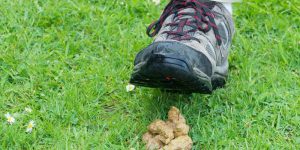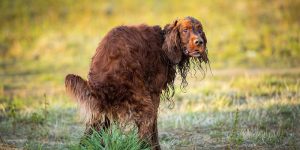Safe Ways to Dispose of Dog Waste.
Not a very pleasant subject, but this does unfortunately come with the territory of dog owning. This Holidays 4 Dogs article will discuss dog fouling and safe ways to dispose of dog waste.
As responsible dog owners we must make sure we scoop the poop while on our daily walk. Indeed, in many public spaces it is an offence not to pick up after our dogs and, in some cases, can result in a £1,000 fine for failing to do so. In urban spaces, bins are usually provided by the council specifically for safely depositing canine waste. However, it is legal to put it in an ordinary litter bin. If there aren’t any bins, you must take it home with you.
to put it in an ordinary litter bin. If there aren’t any bins, you must take it home with you.
I was unsure whether it was in fact legal to put canine waste in with normal household domestic waste, but my own local council website suggests taking canine deposits home and placing in your ordinary household refuse bin.
Therefore, I assume – within my area at least – this is acceptable and legal. Check out your own council website for any information relevant to your area.
Dog fouling laws.
According to The Dogs (Fouling of Land) Act 1996, any land which is open to the air and to which the public have entitled, or permitted access, (with or without payment) is included. However, there are exemptions;-
- Agricultural farmland and woodland.
- Land which is predominantly marshland, moor or heath.
- Common Land – (However my council state this does not include village greens or playing fields).
- The highway and land alongside where the vehicular speed limit is greater than 40 miles per hour.
Thus, technically speaking, you do not have to pick up deposits in the above exempt areas. However, you should always be responsible about this. Agricultural land grazed by livestock can become very sick from ingesting worms found in dog excrement. Similarly, dog fouling can be extremely unpleasant for other people using open spaces and countryside. Always scoop the poop and bin it.
Getting rid of dog poop at home.
The legality of putting dog waste directly into the sewage system seems to be debatable. No definitive answer could be established for this Holidays4Dogs article. According to Cornwall Council, sewage treatment plants do not adequately kill bacteria, or parasites. Therefore, this particular council do not support, or recommend, putting dog waste into the sewage system. Holidays4Dogs do not recommend that carers use this method of disposal.
Dog loo.
Other ways to dispose of dog fouling waste would include use of a These incorporate two buckets which fit inside each other and are buried underground. The bottom bucket is filled with water and a bio-activator which decomposes the waste rapidly. The waste is deposited into the water and every so often is flushed through (with a hose) taking the decomposed matter through slots in the upper bucket.
Wormery.
Another option is to use a wormery! These systems are available for specific disposal of canine waste and consist of single, or stacked chambers. However, toxocara canis – roundworms – can survive the composting process and although the risk of toxocariasis to humans is not huge, it is still a risk that needs to be weighed up. However, if there is dog waste in the garden anyway, the risk of contamination already exists.
– can survive the composting process and although the risk of toxocariasis to humans is not huge, it is still a risk that needs to be weighed up. However, if there is dog waste in the garden anyway, the risk of contamination already exists.
It is recommended the compost produced from dog waste is not used on flower beds where children play, or on vegetable plots.
While councils U.K. wide spend 72.5 million pounds depositing 700,000 tons of dog waste into landfill sites, one entrepreneur is developing the first commercial scale dog waste disposal system which will convert doggy doo into bio-gas.
In talks with an unnamed council, the company proposes to dog fouling waste into methane, CO2 and fertiliser. The company claims the system would be capable of powering 60 homes at a time. Not surprisingly, there has been a great deal of interest with councils across the U.K. This would, undoubtedly, be a revolutionary way of disposing of dog waste safely while, at the same time, creating green energy.
Professional poop scoopers.
Finally, if you really would rather leave the nasty bits of dog owning to someone else, there are companies springing up around the U.K. who will come and remove it for you. However, although they will pick up in biodegradable bags.
They will thoroughly clean and disinfect hard surfaces, will not take deposits away. So although you may avoid the nasty, smelly bit, you will still have the dilemma of what to do with it.
Eating and pooping.
And on the subject of doggy deposits, a good tip is to consider feeding your dog the BARF diet. See our other Holidays4Dogs article on the subject – Food for thought). A raw meat diet produces much less in the way of doggy waste and is far less offensive to deal with. It also degrades far more rapidly and has a much less of a foul odour. The barf diet is also reputed to make the dogs gut less of a suitable environment for bacteria and parasites to flourish, thus limiting the possibility of environmental contamination.
Conclusion.
Dog fouling is unpleasant for everyone in the community and it can pose health a hazard to people and other animals. Always be responsible – pick up after your dog, and dispose of it in a suitable bin.
Holidays4dogs.co.uk and 4Dogs are participants in the Amazon Services LLC Associates Program, an affiliate advertising program designed to provide a means for sites to earn commission fees by advertising and linking to the following websites. Read our full disclosure agreement here https://www.holidays4dogs.co.uk/affiliate-disclosure/


